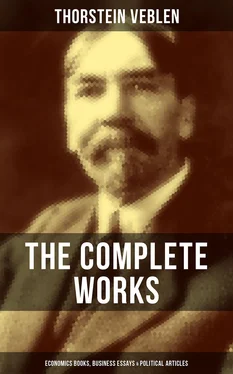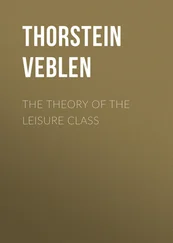There are other and more natural ways of reaching the same results, ways more consonant with that archaic scheme of usages on which the new institution of property is to be grafted. (a) In the known cultures of this simpler plan there are usually, or at least frequently, present a class of magicians (shamans, medicine men, angekut), an inchoate priestly class, who get their living in part “by their wits,” half parasitically, by some sort of tithe levied on their fellow members for supernatural ministrations and exploits of faith that are worth as much as they will bring. 100As the industrial efficiency of the community increases with the technological gain, and an increasing disposable output is at hand, it should naturally follow, human nature being what it is, that the services of the priests or magicians should suffer an advance in value and so enable the priests to lay something by, to acquire a special claim to certain parcels of land or cultivated trees or crops or first-fruits or labour to be performed by their parishioners. There is no limit to the value of such ministrations except the limit of tolerance, “what the traffic will bear.”
And much may be done in this way, which is in close touch with the accustomed ways of life among known savages and lower barbarians. To the extent to which such a move is successful it will alter the economic situation of the community by making the lay members, in so far, subject to the priestly class, and will gather wealth and power in the hands of the priests; so introducing a relation of master and servant, together with class differences in wealth, the practice of exclusive ownership, and pecuniary obligations. (b) With an accumulation of wealth, whether in portable form or in the form of plantations and tillage, there comes the inducement to aggression, predation, by whatever name it may be known. Such aggression is an easy matter in the common run of lower cultures, since relations are habitually strained between these savage and barbarian communities. There is commonly a state of estrangement between them amounting to constructive feud, though the feud is apt to lie dormant under a modus vivendi so long as there is no adequate inducement to open hostilities, in the way of booty. Given a sufficiently wealthy enemy who is sufficiently ill prepared for hostilities to afford a fighting chance of taking over this wealth by way of booty or tribute, with no obvious chance of due reprisals, and the opening of hostilities will commonly arrange itself. The communities mutually concerned so pass from the more or less precarious peaceful customs and animus common to the indigent lower cultures, to a more or less habitual attitude of predatory exploit. With the advent of warfare comes the war chief, into whose hands authority and pecuniary emoluments gather somewhat in proportion as warlike exploits and ideals become habitual in the community. 101More or less of loot falls into the hands of the victors in any raid. The loot may be goods, cattle if any, or men, women and children; any or all of which may become (private) property and be accumulated in sufficient mass to make a difference between rich and poor. Captives may fall into some form of servitude, and in an agricultural community may easily become the chief item of wealth. At the same time an entire community may be reduced to servitude, so falling into the possession of an absentee owner (master), or under resident masters coming in from the victorious enemy.
In any or all of these ways the institution of ownership is likely to arise so soon as there is provocation for it, and in all cases it is a consequence of an appreciable advance in the industrial arts. Yet in a number of recorded cases a sufficient advance in technology does not appear to have been followed by so prompt an introduction of ownership, at least not in the fully developed form, as the surface facts would seem to have called for. Custom in the lower cultures is extremely tenacious, and what might seem an excessive allowance of time appears to be needed for so radical an innovation in the habitual scheme of things as is involved in the installation of rights of ownership. There are cases of a fairly advanced barbarian culture, with sufficiently coercive government control, an authoritative priesthood, and well-marked class distinctions which hold good both in economic and social relations, and yet where the line of demarkation between ownership and mastery is not drawn in any unambiguous fashion - where it is perhaps as accurate a statement as the case permits, to say that this distinction has not yet been made, and so would, if applied, mark a difference that does not yet exist. 102So long as overt predatory conditions continue to rule the case, - e. g., so long as the community in question continues, in a sense, under martial law, “in a state of seige,” where the holders of the economic advantage hold it on a tenure of prowess or by way of delegated power and prerogative from a superior of warlike antecedents and dynastic right, - so long the rights of ownership are not likely to be well differentiated from those of mastery. Much the same characterisation of such a state of things is conveyed in the current phrase that “the rights of person and property are not secure.” The very wide prevalence in the barbarian cultures of some such state of things argues that the genesis of property rights is likely to have been something of this kind in the common run, though it does not in other cases preclude a different and more peaceable development out of workmanlike or priestly economies.
But even if it should be found, when the matter has been sifted, that the genesis of ownership is of the latter kind, it would also in all probability be found that among the peoples whose institutional growth has a serious genetic bearing on the Western culture the holding of property has, late or early, passed through a phase of predatory tenure in which the distinction between ownership and mastery has so far fallen into abeyance as to have had but a slight effect on the further development. Where, as appears frequently to have been the case both in Europe and elsewhere, the kingship and temporal power has arisen out of the priestly office and spiritual power - or perhaps better where the inchoate kingship was in its origins chiefly of a priestly complexion, with a gradual shifting of kingly power and prerogative to a temporal basis, 103- there the transition from a creation of property and mastery rights by priestly economies (fraud?) to a tenure of wealth and authority by royal prerogative (force?) will have so blended the two methods of genesis as to leave the attempt at a hard fast discrimination between them somewhat idle.
But whatever may be conceived to have been the genesis of ownership, the institution is commonly found, in the barbarian culture, to be tempered with a large infusion of predatory concepts, of status, prerogative, differential respect of persons and economic classes, and a corresponding differential respect of occupations. Whether property provokes to predation or predation initiates ownership, the situation that results in early phases of the pecuniary culture is much the same; and the causal relation in which this situation stands to the advance in workmanship is also much the same. This relation between workmanship and the pecuniary culture brought on with the advent of ownership is a twofold one, or, perhaps better, it is a relation of mutual give and take. The increase in industrial efficiency due to a sufficient advance in the industrial arts gives rise to the ownership of property and to pecuniary appreciations of men and things, occupations and products, habits, customs, usages, observances, services and goods. At the same time, since predation and warlike exploit are intimately associated with the facts of ownership through its early history (perhaps throughout its history), there results a marked accentuation of the self-regarding sentiments; with the economically important consequence that self-interest displaces the common good in men’s ideals and aspirations. The animus entailed by predatory exploit is one of self-interest, a seeking of one’s own advantage at the cost of the enemy, which frequently, in the poetically ideal case, takes such an extreme form as to prefer the enemy’s loss to one’s own gain. And in the emulation which the predatory life and its distinctions of wealth introduce into the community, the end of endeavour is likely to become the differential advantage of the individual as against his neighbours rather than the undifferentiated advantage of the group as a whole, in contrast with alien or hostile groups. The members of the community come to work each for his own interest in severalty, rather than for an undivided interest in the common lot. Such sentiment of group solidarity as there may remain falls also into the invidious and emulative form; whereby the fighting patriot becomes the type and exemplar of the public spirited citizen, whose ideal then is to follow his leader and humble the pride of those whom the chances of contention have thrown in with the other side of the game. The sentiment of common interest, itself in good part a diffuse working-out of the parental instinct, comes at the best to converge on the glory of the flag instead of the fulness of life of the community at large, or more commonly it comes to be centred in loyalty, that is to say in subservience, to the common war-chief and his dynastic successors.
Читать дальше












